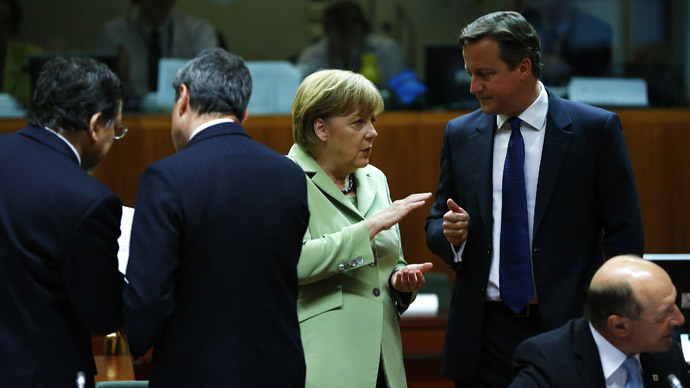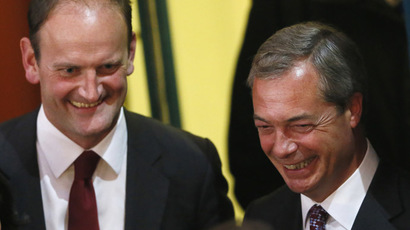UK, Europe on collision course over €2.1bn bill

Senior EU officials insist that Britain must pay a €2.1 billion surcharge by December, and have the backing of France and Germany, despite Prime Minister David Cameron’s insistence that he won’t pay.
Cameron stated flatly on Friday that Brussels “had another thing coming” if they thought they were going to get the €2.1 billion (US$2.7 billion) demand by the deadline. The president of the European Commission, Jean-Claude Juncker, a staunch pro-European technocrat, said the UK PM would be viewed as a coward if he didn’t get his checkbook out.
READ MORE: UK demands emergency talks after £1.7bn EU bill
“You [Cameron] must show some political courage there is nothing that can be done,” said Juncker, who Cameron earlier this year tried to block from becoming Commission president.
German Chancellor Angela Merkel, leader of the most powerful country in Europe, has also sided with Brussels over the issue.
“This did not come out of the blue. I understand that it’s difficult to come up with €2 billion, David, but this should have been expected,” said Merkel.
The vice president of the European Parliament, German MEP Alexander Lambsdorff, told the BBC Saturday that “everybody has to pay their dues.”
“If you have higher GDP growth than forecast, that also means logically that you have a higher contribution to the community’s budget,” he said.
Socialist French President Francoise Hollande also laid into Cameron accusing him of “dishonesty,” because of the annual rebate the UK gets, won by Thatcher 30 years ago.
“You want to play the system so it suits only you,” said Hollande, who himself won’t have to find any money because France received a €790 million rebate.
Hollande’s Gallic sneering was mirrored in the French press, which accused the ranting Cameron of acting like a disgruntled guest in the 1970s British sitcom Fawlty Towers. The owner of the hotel, Basil Fawlty, played by actor John Cleese, was notorious for his rudeness and indifference to his guests.
“A diner unconvinced by the proposed EU menu, David Cameron refuses to pay the bill,” wrote Europe 1 on its website.

Le Parisian suggested Cameron’s angry reaction to the bill was because of the growing success of the UK Independence Party, which now claims 27 percent of the vote.
READ MORE: UKIP cruising towards 2nd parliamentary seat – poll
It has also emerged that the UK Treasury knew about the bill at least by the beginning of this week, but did not inform the PM, who only found out on Thursday.
But the UK government and Cameron have defended the Treasury, saying it’s usual practice for officials to get to the bottom of a demand before bothering ministers.
“You can all do ‘Who knew what whens’, and all the rest of it, but actually, frankly, you don’t need a [board game] Cluedo set to know that someone has been clubbed with the lead piping in the library,” said the PM.
The reaction the €2.1 billion demand by the largely Euroskeptic British press was predictable, with the Telegraph calling the request “shocking” and “outrageous” and the Mail questioning why the UK should be penalized for economic success while France won a rebate for a poorer-than-expected economic performance.
But the Financial Times was more astute about Cameron’s outburst, saying it was “disproportionate” and that the surcharge was “reasonable.”
The pro-European Guardian also said that the PM should have known about the charge and questioned whether his reaction might have been exaggerated for political purposes.
“Either Mr. Cameron's outrage was synthetic and cynical. Or he and his ministers and officials were asleep on the watch and let it catch them unawares. It is hard to know which is worse," wrote the newspaper.
The reverberations of this cash demand will be felt for months if not years, as Britain edges closer and closer to the possibility of leaving the EU.
Italian Prime Minister Matteo Renzi, also faced with a surcharge, told fellow European leaders that the demand would be seen by voters in a negative way, and they would now see Europe as full of “technocrats and bureaucrats without a heart or soul.”














